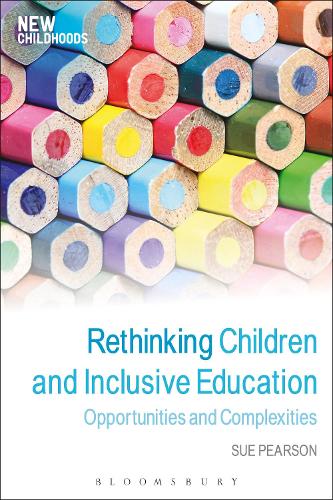
Rethinking Children and Inclusive Education: Opportunities and Complexities
(Paperback)
Available Formats
Publishing Details
Rethinking Children and Inclusive Education: Opportunities and Complexities
By (Author) Dr Sue Pearson
Bloomsbury Publishing PLC
Bloomsbury Academic
6th October 2016
United Kingdom
Classifications
Tertiary Education
Non Fiction
Teaching of students with different educational needs
371.9046
Physical Properties
Paperback
280
Width 156mm, Height 234mm
440g
Description
Rethinking Children and Inclusive Education examines attitudes towards, and experiences of, children's marginalization and inclusion. Sue Pearson draws on a wide range of thought, research and practice from different fields and countries to debate, challenge and reappraise long held beliefs, attitudes and ways of working and living with children with differing needs and learning challenges. This book adopts a broad view of inclusive education that embraces all, with examples mainly but not exclusively related to special educational needs; takes a nuanced perspective which goes beyond reductionist debates about placement; and gives attention to the wider educational and social contexts that envelop schools and those that follow schooling. Throughout, Rethinking Children and Inclusive Education acknowledges some of the tensions, contradictions and overlaps in policies and practices by exploring a variety of UK and international sources. Making an original contribution to current debates, the text emphasises research that adopts a socio-cultural/ecological perspective alongside that which focuses on child factors, including participatory or emancipatory research, and highlights the links between principles, research, policies and practices. Including extensive examples of research, practical activities, key points and guidance on further reading, Rethinking Children and Inclusive Education is essential reading for all those studying childhood at undergraduate and graduate level and of great interest to those working with children in any field.
Reviews
This is an excellent publication that considers the inter relationships of childhood, inclusive education and importantly children's accounts of education. The chapters are wide ranging and combine cutting edge scholarship and research with practical application. This book will be of use to researchers, students and childhood practitioners alike. I strongly endorse this publication and am confident it brings new knowledge and reflection on childhood and inclusive education. * Philip Vickerman, Executive Director to the Vice Chancellor and Professor of Inclusive Education and Learning, Liverpool John Moores University, UK *
This book is a must for all professionals who work with children. It examines the relationship between inclusive education, children as stakeholders and research. There are many different and varying examples of "inclusive groups", a term which can be applied to gay, Roma and disabled people as well as asylum seekers, refugees, people from minority ethnic and cultural groups, economically underprivileged groups and young people who have a chronic illness. Many international examples have been provided. The book draws together a huge amount of national and international research and offers numerous examples and activities to work through. Additional reading is suggested and the chapter summaries and reflective exercises are very useful. All aspects of child participation, issues of power, and implications of what is said are explored. A number of interviews with specialists are included in the book which provides a wider perspective on the issues discussed. Lots of questions are asked in the book...Interesting illustrations about stereotyping and how to explore children's views on this are provided. A very readable book packed with activities alongside pieces of reflection about how children view the complex issues of what inclusive education is, how it works and how it can be improved to include all groups of children throughout the world. Good to find a book which examines inclusive education in a truly inclusive way using international illustrations, activities and research which covers a wide number of often excluded groups. * Sue Ralph, Professor of Education, The University of Northampton, UK *
Author Bio
Sue Pearson is Senior Lecturer at the School of Education, University of Leeds, UK where she co-ordinates the MA (SEN) and the Post Graduate Certificate in Special Educational Needs Coordination. She has lectured and written extensively about inclusive education.
